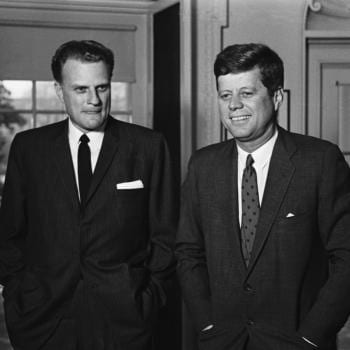Liberalism is on the rocks and it is not coming from conservative talk-radio hosts. For some on the Left, neo-liberalism is a sell-out (no pun intended) to the inequalities of capitalism. That debate has less religious resonance than the critique that Roman Catholic integralists have recently posed against political liberalism. (This website has run a series of articles about integralism.) These two paragraphs from this essay boil down the nature of the conflict well:
“Liberalism tends to think that human beings flourish best when there’s no corporate direction toward a specific vision of the good life,” Pater Edmund told me. “The integralist view is that human happiness involves achieving common goods. So we need a common understanding of what the good is, and it’s possible to reach such an understanding because there really is an objective good for human beings.” And that objective good, for the integralists, is revealed in the authoritative teachings of the Catholic Church.
Traditional Catholic political thinking was heavily influenced by Greek philosophy—particularly Aristotle, as interpreted by Thomas Aquinas. According to this tradition, the good of society takes precedence over the rights of any of its constituent members, who, in any case, can succeed as individuals only within the context of a virtuous society. The supreme task of government is not to protect individual rights but to use the tools at its disposal—law and education—to orient the political community toward the common good, which can be rationally understood as what promotes human flourishing according to human nature. Catholicism modified this basic framework by claiming that, since man’s natural reason was damaged by the Fall, he is unable to perceive his true good without the aid of divine grace, as accessed through the Church. To promote the common good, then, the state needs to recognize the truth of Catholicism.
The problem with liberalism as a governing philosophy (or absence of one) is that it gives no direction to citizens or governments. You don’t need to be a Roman Catholic to see liberalism’s defects. Some Protestants want more in political life than liberalism’s meager helpings. Some have even added love to the idea of common good:
We cannot sustain our life in an order that insists upon keeping questions of ultimate meaning in abeyance in the name of pluralism. To the extent that [this] imagination has taken hold on the American right—and I have real questions about how much it actually has taken hold—the right has embraced obvious error.
Yet the solution put forward by Catholic integralists of a coercive common good conservatism actually fails to live up to its own name…. For the Augustinian civic liberal would insist that governments do not serve the common good by violating the rightful freedom of the individual conscience, amongst many other significant individual freedoms that liberalism has rightly recognized.
Governments cannot be value neutral. But neither can governments truly practice love if they simply negate individual freedom to the degree that someone like [integralists do]. What we need is an account of love that recognizes both the ways in which love calls us to positively guide a person to their rightful end and the ways in which love checks our ambitions and recognizes that the first rule of love is to do no harm.
If the thought of a confessional state, that is, a government taking instruction from Roman Catholic bishops on law, policy, public health, the common good seems like a stretch, one that imagines a Christian understanding of love as the correction to liberalism’s errors appears to be even more remote.
This view does echo another Roman Catholic theologian, David Schindler, not necessarily an integralist, but someone who was critical of liberalism even before some of the integralists started to shave. Here is one summary of Schindler’s outlook:
To live well, Schindler argues, is to live in a way that is proper to our being. Conversely, when a misapprehension of being structures our thinking and actions, we experience unhappiness, brokenness, and poverty in its deepest sense—the absence of meaning. He believes that the modern liberal project from Descartes to Rawls is based on a radical misunderstanding of the nature of reality.
Specifically, liberalism fails to apprehend that “love is the basic act and order of things.” Love brings all there is into existence, it is through love that all there is continues in existence, and it is for love that all things exist. Reality is in this sense triadic: all things are in, through, and for love. Being might therefore be said to be an order or “logic” of love.
What does this have to do with politics? A lot:
Schindler believes that limited government, the separation of church and state, human rights, and religious freedom are legitimate achievements that ought to be preserved. But he simply does not believe (1) that liberalism, or any other conception of order, can successfully prescind from metaphysics (he quotes philosopher Etienne Gilson: “metaphysics always buries its undertakers”), or (2) that these achievements can be preserved if they are grounded in the unwitting metaphysics of liberalism rather than in the metaphysics of love.
… by asking Christians to “bracket” their metaphysical commitments for purposes of public order, liberalism essentially asks them to accept a different metaphysics—indeed, a different theology. Christianity does not present itself as just one pre-critical commitment among others, but as the matrix or “paradigm” of rationality itself. One either rejects that claim, and is therefore not a Christian, or one accepts it as a Christian as the basis for reflection and understanding. There can be no middle, “bracketing” way.
For the Christian, the only adequate notion of reality is one that grows out of a Trinitarian understanding of the logos. The Trinitarian life of God means that love, as we have seen, is at the heart of the structure and meaning of being. But we do not really receive that logos as a logos unless we see that it grounds and transforms our understanding of everything. It is the furthest thing possible from a truth claim that might safely be bracketed from public discussion. Thus, “bracketing” one’s Christian commitments from one’s thinking at any time, as liberalism demands, is to be not only false to Christianity, but to be false to reality.
That sounds inspiring. But what if politics after the Fall needs to begin with citizens and residents not as people trying to live in devotion to God but with the reality of possessing sinful human natures that run up against others’ desires, wishes, or ideas about what’s decent and lawful? Instead of love, what about obeying the laws, paying bills, and supporting the local little league baseball teams? After all, the sort of antithesis that the prophets, apostles, and even Augustine saw between believers and unbelievers, thanks to sin, offers little ground for a common enterprise based on higher ideals, metaphysics, a philosophical end. Most Christian writers when taking sinful human nature into account, and the difference that regeneration makes, take a less ambitious understanding of politics with them into the public square. It could be the covenant that God made with Noah after a catastrophic response to human wickedness: “Whoever sheds the blood of man, by man shall his blood be shed, for God made man in his own image” (Gen. 9:6). Or it could be Paul’s rendition of the Noahic covenant: “[the magistrate] is God’s servant for your good. But if you do wrong, be afraid, for he does not bear the sword in vain. For he is the servant of God, an avenger who carries out God’s wrath on the wrongdoer” (Rom. 13:4). But it has generally been on the side not of a beatific vision than basic social order.
If that is the reality, maybe liberalism looks pretty good.












